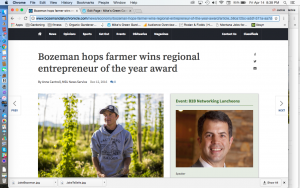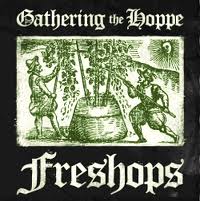
Shownotes
Tell us a little about yourself.
Again my name is Jake TeSelle, grew up here in the Gallatin Valley
traditional field crops from my dad. He raised more traditional crops
- malt barley
- alfalfa
- wheat
- stuff of that nature
When I went to college. I’ve got 5 brothers and sisters… It was like is the family farm gonna sustain another 5 families?
I went into mechanical engineering
turns out I hate that…
started doing research
- high value speciality crops
- things that wouldn’t require
- things that didn’t require millions of dollars
- 100s of acres
- something I could manage myself and still be really valuable…
Tell me about your first gardening experience?
Definitely just the whole field crops.
We’ve had gardens from time to time. Had some raised beds in the back. My parents would grow carrots and stuff in, my little brother was more passioante, then I was.
He’d grow a jar of seeds. Just a little 10×10 plot of wheat.
Does he still garden?
No, not really, he works at a machine shop now.
I’d say more my first large scale experience was the test yard that we built for the hops.
In my backyard had an old dumping ground for a dairy so it was really good soil.
- one acre
- test facility
- bunch of different varieites
- knees in the dirt
- hands-on test
first little acre
We learned a ton, like how much the
mostly the different
How much the soil and local climate maters to hops
all of the different water systems
when we built our production facility. We built this one acre test yard off of things we had researched on the internet. If this worked for them it will for us. But our climate is so different. So we have had to adjust.
What different things did you have to do?
We had to adjust for the way higher heat we have around here,
in the summer
established hop yards
fauna shades the soil enough that it doesn’t get to hot. But when you have a start up hop yard, it will actually cook the roots, so we had to plant a cover crop to shade the soil.
What did you plant?
just alfalfa.
Do you start with starts?
something
You can start one of two ways, either root cuttings
one year old plant is a crown.
crown
kind of a little rootball
there’s a big greenhouse in Michigan that grows these crowns but they are really expensive so we bought rhizome
We have 7 acres going.
So how many plants do you grow in 7 acres?
we planted 800 plants per acre
3200 plants growing right now.
8-9000 lbs…
So you’re planting 800 plants per acre? A hundred at a time one week? is that a perennial? It is right we have some on our fence and it comes back?
It’s a perennial root, that can live up to 25 years…
So they come up on their own?
every spring they will start fresh, dies back to the root,
grows to the top of the trellis…. dies all the way back to it’s root.
Is that hard? Do you have to cut it out? Through the fence/wire?
so the harvest process takes care of that.
piece of cable 15 foot in the air
run a piece of twine to the root.
The vine will wrap around that cable…. hop twines all the way to the top
bush out get a very heavy lots of green matter –
40 or so lbs of just vine and leaves,…
Once you have that vine, cut that whole thing down and it’s on that twine and that’s what you hook up to the harvester so you’re reomoving that every year.
My next questions about who do you sell it to?
So the market –
we initially had not planned on making it a commercial business
thought it would be cool to have a hop farm in our backyard
When we built that one acre test plot. We were like let’s build this, we don’t know much about the crop as a whole
Let’s talk to the brewers and see what’s the interest?
- the market – demand is huge
- Montana hops
- People asked “Can you do that commercially? How do we buy that?”
I think that’s how I found you. And I was in a Facebook group and someone asked and I had talked to Tim Nichols last year and he had said there was a big market and someone in the group said nah, so I had to go research it.
That’s where I found that article about you: http://www.bozemandailychronicle.com/news/agriculture/the-pursuit-of-hoppiness-local-duo-start-bozeman-hop-yard/article_cdd0d210-4ea4-5d5c-b076-2936d46f75c3.html
Are there regulations because last summer when I was working in a restaurant they wouldn’t even let me bring oregano from my garden in to serve with their customers and they were like you would have to prove you were a certified farm is there a thing about hops?
Montana regulations
So in Montana right now there’s kind of not, in the US as a whole, it’s a little bit gray
strict regulations is in pesticide and herbicide use
not producing hops cones
Until kind of mid to late summer
At a stage during spurring,
produces little burs – pokey looking balls at the tips of the vines that become hop cones…
until that happens
there’s nothing you can do to the plant that you can
after it spurs you can’t use any more pesticides or herbicides
once you harvest it
it’s gonna be put in a beer batch that’s gonna be boiled
if theres any fungus or bacteria it’s gonna get boiled off, and it’s not going into a food product… so there are not many restrictions.
Now harvest is not easy right?
Harvest a huge pain in the butt
85 -90% of the work is at harvest time
we did buy a harvester
it’s the first mobile harvester in the state. There’s one in Kalispell.
size of a huge truck
bolted to the floor
There’s one in the bitterroot valley
Just gonna talk about our harvester what we were gonna use that for
plant per minute for picking and it’s mobile so it’s gonna turn into a resource for other hop yards as they spring up
talked to some in Lewiston and other nearby places.
Hop Yards
before us there wasn’t any of the equipment to do that
we shipped our harvester from NY, there’s a start up out there… latching onto all these startups.
we got version 2 of the machine
first year they built a proto-type
70 pre-orders
They built 70 this year and we got one.
What would you tell someone who’s maybe never heard of growing hops but want to get into a green job… something that you wouldn’t do again or some advice?
I think the best advice I could give is start small, start as small as possible
if the plants are suited for your climate
variety isn’t good for your soil
so many unknowns in Montana as a whole
unknowns
the soil and the climate dictate what you can grow.
starting small is gonna save you a lot of time!
The rhizomes suppliers on the internet
Freshops out in Oregon,
produce rhizomes commercially
lots of mom and pop, some guy in his backyard and you’ll send 3 bucks in the mail… there’s lots of ways to get small quantities of rhizomes
Tell us about something that grew well this year.
This will be our 3rd year.
Just the survival rate… learning from the test yard, learn by doing, that school of hard knocks… really taught us what we needed to know for the expansion to thrive
Our initial test yard
- We had horrible plant nitrition
- irrigation system was faulty
- so many plants were dying.
- Our fertilizer mix was wrong
- soil wasn’t shaded so we had a lot of heat death
- we had so many problems it was really disheartening!
- Last year our expansion we put in 3200 plants and virtually all survived!
Is there something you would do different next year or want to try/new?
I’m excited to get more hands-on with the plants.
Last year was more construction
- building the whole facility
- building processing equipment
trying to figure out how to hook this stuff up electrically
Lots of construction – back end start of stuff
This year I’m excited to be walking the hops yard….
making sure they are getting enough proper nutrition
Really just seeing them thrive this year.
What does your family think of all this? Are they like you rebel! You’re changing our land! Or are they supportive? You go guy!
they’ve come a long way…
it’s been mixed
Initially they thought it was crazy!
they thought there is no way it’s gonna work!
The sheer the amount of capital to build the infrastructure to grow hops
- trellising is very expensive
- speciality irrigation and fertilizer
- your gonna deplete your savings
That was what was nice about the grant, that kind of eased their doubts there.
Wait, tell me about the grant? How’d you get the grant?
Well based off of back to when we talked to the brewers and we saw that demand and the market needed these hops and they were wiling to pay a premium for a local product!
So we started looking at financing
banks and traditional roots
We got plugged into the department in ag
because of our experience and success with the test yard we were able to formulate a plan. We have this much money will you match it and help us buy the processing equipment?
- originally the grant was to buy plants and trellising
but that’s what enabled us to buy
- ...






